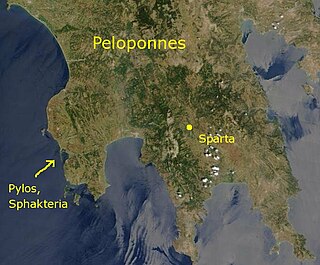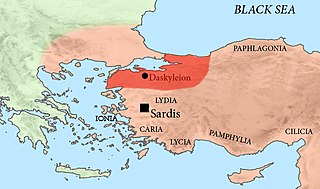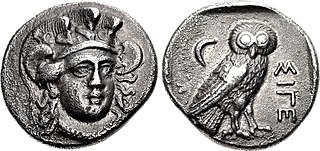Stesicles was an Athenian general sent in 373 BC with a force of some 600 targeteers to aid the democratic party at Corcyra against the Spartans under Mnasippus. A more effective armament of 60 ships, with Timotheus for commander, was to follow as soon as it could be got ready. Meanwhile, Stesicles, with the assistance of Alcetas I of Epirus, effected an entrance into the town under cover of night. Here he reconciled the dissensions of the democratic party, united them against the common enemy, and conducted that series of successful operations, which ended in the defeat and death of Mnasippus, and the withdrawal of the Spartan fleet even before the arrival of Iphicrates, who had superseded Timotheus . There can be no question as to the identity of the Stesicles of Xenophon with the Ctesicles of Diodorus. But the latter writer tells us that Ctesicles had been sent sometime before to Zacynthus, to take the command against the Spartans of the Zacynthian exiles, whom Timotheus had restored. Johann Gottlob Schneider would reconcile the two authors by supposing that he was ordered to proceed from Zacynthus to Corcyra, nor does this seem so inconsistent with the language of Xenophon as Connop Thirlwall and Carl Rehdantz represent it. [1]

Sparta was a prominent city-state in ancient Greece. In antiquity the city-state was known as Lacedaemon, while the name Sparta referred to its main settlement on the banks of the Eurotas River in Laconia, in south-eastern Peloponnese. Around 650 BC, it rose to become the dominant military land-power in ancient Greece.
Mnasippus of Sparta, was appointed to the command of the armament which was sent to Corcyra, in 373 BC, to recover the island from the Athenians. Having landed there, he ravaged the country, and, blockading the city by sea and land, reduced the Corcyraeans to the greatest extremities. Imagining, however, that success was now within his grasp, he dismissed some of his mercenaries and kept the pay of the rest in arrear. It would appear, too, that discipline was less strictly preserved among his men than heretofore ; for we read that- the several posts of the besiegers were now imperfectly guarded, and that their soldiers were dispersed in straggling parties throughout the country. The Corcyraeans, observing this, made a sally, in which they slew some, and made some prisoners. Mnasippus proceeded in haste against them, ordering his officers to lead out the mercenaries ; and, when they represented to him that they could not answer for the obedience of the men while they remained unpaid, he met their remonstrances with blows — an exhibition of coarse arrogance by no means uncommon with Spartans in power. It may well be conceived that the spirit which animated his troops was not one of alacrity or of attachment to his person. In the battle which ensued close to the gates of the town, the Corcyraeans were victorious and Mnasippus was slain. According to Diodorus, these successful operations were conducted under the command of Ctesicles, whom the Athenians had sent to the aid of Corcyra with a body of 500 or 600 targeteers.

Timotheus was a Greek statesman and general who sought to revive Athenian imperial ambitions by making Athens dominant in a Second Athenian League. He was the son of the Athenian general, Conon. Isocrates considered that Timotheus was superior to the other commanders of his time and showed all the requisites and abilities of a good general.










